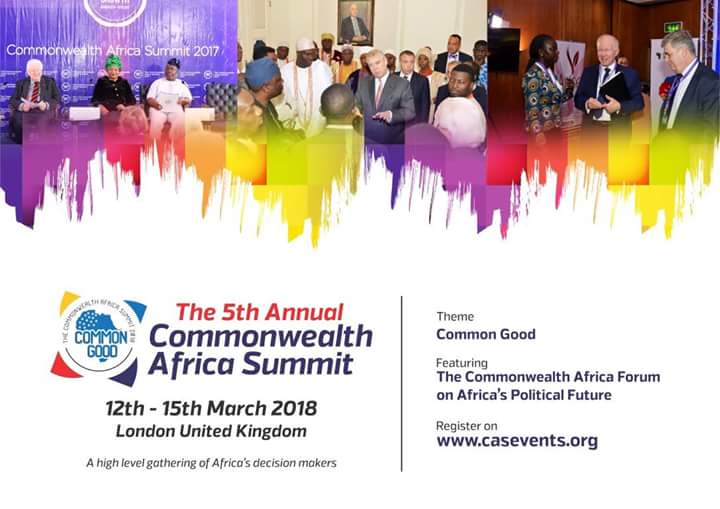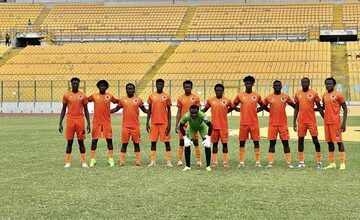
Speech at the Opening Ceremony of the 5th Annual Commonwealth Africa Summit- March 13, 2018.
Thank you, and Good Morning Ladies and Gentlemen,
I am happy to be here with you at the Commonwealth Africa Summit, which has over the last five (5) years become a part of the celebration of The Commonwealth Week, and brings together over 300 Africans and friends of Africa every year to deliberate on the challenges facing our beloved continent and the way forward in creating a common prosperity for all our people.
It is proposed by the early philosophers Hobbes, Locke and Rousseau that humans at first lived in a state of lawlessness. It was a state of survival of the fittest. The strongest survived and the weakest of the species died.
This in a way is the basic principle that underlies the theory of evolution.
When mankind continued to evolve, and came to the realization that life was better under an organized rules-based society, where progress was determined by how much members of the community could work together both for their individual interest and that of the society as a whole, the underlying principle of society was no longer based on survival of the fittest and extinction of the weak, but on societies that not only sought the common good but also protected the weak and vulnerable.
The principle of the Common Good emerged and has continued to evolve. In modern lexicon, we speak about ‘common wealth’, ‘shared prosperity’, ‘collective growth’, ‘inclusive growth’.
Our actions in respect of achieving a common good has been instinctive- Ingrained by custom, tradition and centuries of socialization.
Almost 400 years ago in this very city of London, one of the greatest poets in all of English literature that the world has known, John Donne, penned down some eternal lines in an essay he titled, ‘’An Essay on Man’’.
“No Man is an Island’
No man is an island entire of itself; every man is a piece of the continent, a part of the main;””
John Donne goes on to say:
Any man’s death diminishes me,
Because I am involved in mankind.
And therefore never send to know for whom the bell tolls; it tolls for thee.”
�John Donne’s poem is a poignant reminder to us that we are connected. All of us in this room and all of our countries, are all connected to the main. We are connected as a world and we are connected at the strings as humanity.
The formation of regional, continental and global bodies has helped to galvanise us around common causes, for the common good.
Only recently, working together on the Millennium Development Goals, under the auspices of the United Nations, the world embarked on the most successful anti-poverty movement in history.
It cut the number of people living in extreme poverty by half, from 1.9 billion in 1990 to 836 million in 2015. It also cut by half the proportion of undernourished people living in the developing world. The world is united once again in achieving the targets of the Sustainable Development Goals, which will inure to our common good as humanity.
Another worthy cause has been reflected in the world coming together to ensure our common survival as a planet through the Paris Climate Change Agreement.
But despite these lofty ideals, our world is still rift with a self-serving constant battle for superiority, power and control over others. World wars have been fought. Violent conflicts are still ongoing. Inequality exists on the global, regional and even domestic scale.
Notwithstanding the progress we have made collectively, the most powerful countries have often voted their country’s interest above all else, and less powerful communities of people and countries of the world have often been left behind.
‘America First’, the Trumpian mantra, is a clear sign that in spite of our desire for a fairer and just world, there is ideological posturing that threatens the ethos of achieving a common good. America’s withdrawal from the Climate Change Agreement, the Mexican border wall, looming tariff wars are all threatening to unravel the world order we have become used to.
An invisible yet palpable wall of obstruction acts as barricade, separating and neatly placing each country at the extreme ends of binary opposition: north versus south; east versus west; rich versus poor; developed versus developing.
In the end, instead of the Common Good, we are separated by Common Distance. And there is a price to pay.
The famous American Poet, Robert Frost, puts it succinctly in ‘Mending Wall’:
‘‘Before I built a wall I’d ask to know
What I was walling in or walling out…’’
You need to think deeply about the purpose of that wall you are constructing. Are you really keeping anything in or are you truly keeping something out? Inimical to the common good is the walls and barriers, both physical and mental, that we have began erecting throughout the world and in our minds.
And Ladies and Gentlemen,
Some historic walls have come down. The Berlin wall. The fall of the “Iron Curtain”, all in heady days when we believed that the end of the cold war was going to yield a massive peace dividend.
The savings gained from the end of the arms race, we were told was enough to assure prosperity for every person on the globe.
Instead of the peace dividend and a renewed commitment to work for the common good, new walls are coming up, including President Donald Trump’s estimated $33 billion, 900-mile-long, 30 feet high Mexico Wall. Other countries newly admitted into the EU, like Hungary, are building border fences spanning hundreds of kilometres.
But the more dangerous walls are the walls we build in our minds. The recent rise in populism and xenophobia around the world has erected mental barriers or walls that are inimical to the common good.
It is factual that the spectre painted in the minds of many Britons, of hordes of Muslim refugees pouring into Britain convinced them to vote BREXIT. Fear is a basic human instinct and motivates us to act in ways that may not be conducive to the common good. It makes us erect barriers or walls to keep out what we fear. But can these walls truly keep anything out or in?
As President, I had a first-hand experience of the nature of fear and walls and their effect during the outbreak of the deadly Ebola Virus Disease in some countries in West Africa.
When the outbreak began, the initial – perhaps panic-driven – response of many countries in Africa and the rest of the world was to close their borders and airspace to travellers from the affected countries.
My country, Ghana, was one of the few countries that, following the implementation of strict medical protocols, did not shut our borders for travel to and from the affected countries.
Ironically, the disease skipped Ghana and rather spread to places whose borders had closed to persons from the affected countries. Indeed, the disease travelled past the Atlantic and Mediterranean Oceans into America and Europe respectively.
By opening up Ghana’s borders and allowing the country to be used later as the UN staging post for the movement of drugs and logistics, rather than choosing the easier option of putting up walls or closing our borders and minding our own business, we were able with the aid of the UN and the international community to halt the scourge of Ebola- That was a ‘Common Good!’
Ladies and Gentlemen,
We cannot speak of the ‘Common Good’ if we turn our backs to our neighbour in their time of dire need. We cannot turn our backs to oppression in any form; to genocide or ethnic cleansing. We must fight and defeat racism, bigotry and xenophobia.
We must intercede for humanity no matter the cost. The fate of the Rohingya Muslims is a scar on the conscience of the world.
This means we must first break down the structures that feed on and promote inequality at all levels in our individual societies. We must fight inequalities in all its forms among nations.
Today, an incident in Africa can have far reaching consequences on the rest of the world. An incident in the Gulf States can result in a slump or rise in oil prices. We are connected.
Our common good entails the creation of opportunities in Africa, so that our youth do not hazard all to seek a better life across the Sahara and the Mediterranean.
Africa is moving forward! Not as fast as we would wish, but definitely there is something happening on the continent.
I have had the experience of being voted out of office as an incumbent. I have witnessed Gambians offload President Yahya Jammeh. Mugabe was eased out of power, Uhuru and Kagame were retained in office, Zuma was compelled to resign, famous footballer Oppon Weah has become President of Liberia, Sierra Leone is facing a run-off with the opposition candidate leading in the first round of poll.
All these are the collective experiences of the African continent. Democratic consolidation is occurring and the people rightly or wrongly are making their choices.
Our people are not willing to be led passively and are demanding accountability from our leaders. There must be a democratic dividend, and our people want to feel the benefits of that dividend now.
Waiting to vote every four (4) or five (5) years as the political term of office may be, is not enough.
In my country, Ghana, things are not perfect, but the period of the 4th Republic, 1992 to date, has seen the longest period of sustained economic growth and expansion than in any comparable period in our history.
Africa faces a youth bulge. How do we accelerate African economies in order that we are creating growth that is inclusive, and ensuring a shared prosperity for all? We cannot achieve this in the 54 little states that we are.
We need to open the borders for our people, goods and services to move seamlessly across the continent. We must leverage Africa’s size and market for the common good of all Africans.
I implemented the protocol for the issuance of visas on arrival for all African Passport holders in June 2016. This has taken away the hassle African business people experienced travelling in and out of Ghana.
We can do same for the whole continent. Not only for people but also for goods. We must open the opportunities of our economies to our people. This will stem the outflow of over $190 billion from the continent each year (E.g. in the road construction industry).
African business people will reinvest their monies in the African economy. Technology is available and for sale. We must not see investors as only foreigners.
The Commonwealth of Nations, is not an accident of history. It was constituted by a deliberate amalgamation of shared dreams, shared values and our shared wealth– our ‘common wealth.’ That is why, right here, right now, the change we seek ought to begin with us.
In order for us to achieve the common good, we need to review our entire relationship and create opportunities for our Commonwealth Members in the areas of trade, education, science and technology, cultural exchange, infrastructure, food and agriculture, security, energy, sports and entertainment among others.
Human resource is not the problem. Africa has great talent – vibrant, innovative and dynamic young brains that are eager and ready to contribute to moving the Continent’s fortunes to the next level- a generation of millennials that have the training and innovation to take up the baton of leadership.
But we cannot achieve this without the equal and active participation of our women.
What is required in Africa is investment. Investment in these youths to deploy their skills, their talents and their innovativeness. Venture financing that allows the youth to transform their dreams and aspirations into multimillion Pound businesses. ===
Investment in social and economic infrastructure, in manufacturing plants that add value to the natural resources available on our continent in order to expand the availability of good paying jobs, increase taxes collected by our States in order to further open up our countries for more investments and business.
In furtherance to the Common Good, Europe should not set, sometimes, impossible limits intended solely to prevent African and other least development countries from accessing their markets. It happens sometimes.
But when we pass certain laws and bring in some regulations like the local content law we promulgated in Ghana, then the Western Countries become uncomfortable and position even your laudable economic efforts as nothing but a failure.
Ladies and gentlemen,
There might be setbacks in our work to achieve benefits for our common prosperity, but it must not deter us in continuing the struggle, because after all the survival of mankind is a collective one. A section of the human race cannot survive in isolation.
The world’s resources are finite and the only optimum utilization we can achieve of these resources would be for it use for the common good of all mankind.
I hope I have set your minds thinking about a few issues under the theme, which we will see further expanded on during the various sessions over the next two days.
Thank you and I wish you a successful Summit.
ahotoronline.com|Ghana




